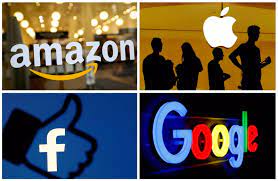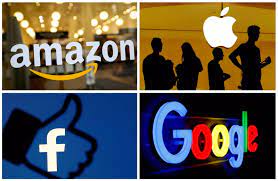
The business models and key business practices of the largest American tech companies including Alphabet owned Google, Amazon, Apple, Meta, and Microsoft, may have to be adjusted by the businesses in Europe in order to meet the requirements of potential new landmark measures to limit the powers of the tech giants following an agreement for the same between European Union countries and European politicians.
After eight hours of talks, France, which now holds the rotating EU presidency, tweeted that a provisional deal had been reached.
In a tweet, EU Industry Commissioner Thierry Breton stated that the agreement would ensure fair and open digital markets.
"What we want is simple: fair markets also in digital. Large gatekeeper platforms have prevented businesses and consumers from the benefit of competitive digital markets," EU antitrust chief Margrethe Vestager, who proposed the rules just over a year ago, said in a statement.
"This means that the time of long antitrust cases, during which the authorities were lagging behind the big tech companies, is over," said EU lawmaker Andreas Schwab, who had steered the debate in the European Parliament.
The Digital Markets Act (DMA) establishes guidelines for online gatekeepers, or companies that regulate access to data and platforms.
Online intermediary services, social networks, search engines, operating systems, online advertising services, cloud computing, video-sharing services, web browsers, and virtual assistants will all be covered.
The DMA requires that digital companies make their messaging systems interoperable and give business users access to their data. Users would be allowed to promote rival items and services on a platform and make deals with clients outside of it.
The guidelines forbid corporations from preferring their own services over those of competitors or from preventing consumers from uninstalling pre-installed software or apps.
The DMA will apply to enterprises with a market capitalization of 75 billion euros, an annual turnover of 7.5 billion euros, and a monthly user base of at least 45 million.
Breaching the laws can result in fines of up to 10 per cent of a company's annual global revenue, with fines of up to 20 per cent for repeat offences.
Apple, which has been a vocal opponent of the DMA, underlined its concerns.
"We remain concerned that some provisions of the DMA will create unnecessary privacy and security vulnerabilities for our users while others will prohibit us from charging for intellectual property in which we invest a great deal," it said in a statement.
Google, which has also increased its lobbying efforts in the recent year, expressed similar thoughts.
"While we support many of the DMA's ambitions around consumer choice and interoperability, we're worried that some of these rules could reduce innovation and the choice available to Europeans. We'll now take some time to study the final text, talk with the regulator and work out what we need to do to comply," it said in a statement.
(Source:www.economictimes.com)
After eight hours of talks, France, which now holds the rotating EU presidency, tweeted that a provisional deal had been reached.
In a tweet, EU Industry Commissioner Thierry Breton stated that the agreement would ensure fair and open digital markets.
"What we want is simple: fair markets also in digital. Large gatekeeper platforms have prevented businesses and consumers from the benefit of competitive digital markets," EU antitrust chief Margrethe Vestager, who proposed the rules just over a year ago, said in a statement.
"This means that the time of long antitrust cases, during which the authorities were lagging behind the big tech companies, is over," said EU lawmaker Andreas Schwab, who had steered the debate in the European Parliament.
The Digital Markets Act (DMA) establishes guidelines for online gatekeepers, or companies that regulate access to data and platforms.
Online intermediary services, social networks, search engines, operating systems, online advertising services, cloud computing, video-sharing services, web browsers, and virtual assistants will all be covered.
The DMA requires that digital companies make their messaging systems interoperable and give business users access to their data. Users would be allowed to promote rival items and services on a platform and make deals with clients outside of it.
The guidelines forbid corporations from preferring their own services over those of competitors or from preventing consumers from uninstalling pre-installed software or apps.
The DMA will apply to enterprises with a market capitalization of 75 billion euros, an annual turnover of 7.5 billion euros, and a monthly user base of at least 45 million.
Breaching the laws can result in fines of up to 10 per cent of a company's annual global revenue, with fines of up to 20 per cent for repeat offences.
Apple, which has been a vocal opponent of the DMA, underlined its concerns.
"We remain concerned that some provisions of the DMA will create unnecessary privacy and security vulnerabilities for our users while others will prohibit us from charging for intellectual property in which we invest a great deal," it said in a statement.
Google, which has also increased its lobbying efforts in the recent year, expressed similar thoughts.
"While we support many of the DMA's ambitions around consumer choice and interoperability, we're worried that some of these rules could reduce innovation and the choice available to Europeans. We'll now take some time to study the final text, talk with the regulator and work out what we need to do to comply," it said in a statement.
(Source:www.economictimes.com)





